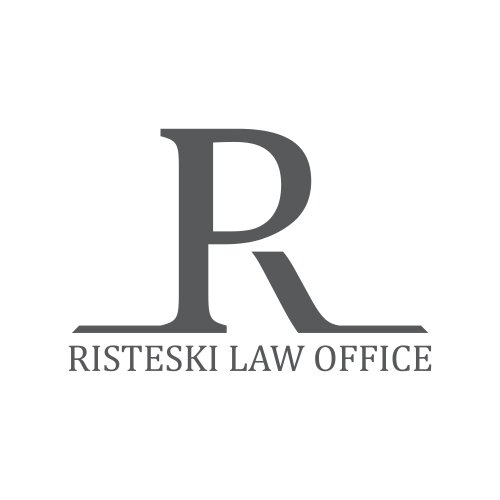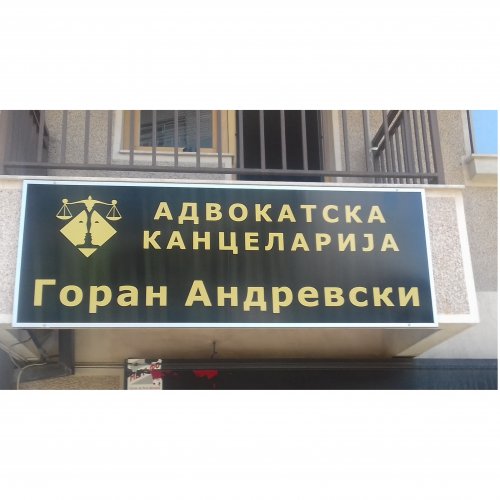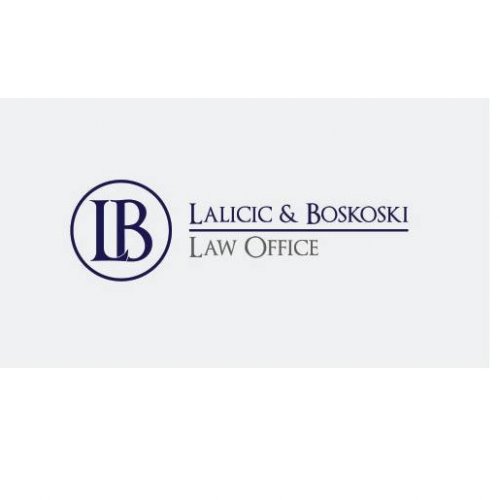Best Tax Increment Financing Lawyers in North Macedonia
Share your needs with us, get contacted by law firms.
Free. Takes 2 min.
Or refine your search by selecting a city:
List of the best lawyers in North Macedonia
About Tax Increment Financing Law in North Macedonia
Tax Increment Financing (TIF) is a public financing method that is used to subsidize infrastructure, community improvement projects, and other private developments. In North Macedonia, TIF is a relatively new instrument aimed at stimulating economic development by using the future increase in property tax revenues generated by a specific project to finance the upfront costs of that project. The key idea is to use projected future gains in taxes to pay for the present cost of a project. This creates opportunities for municipalities to invest in infrastructure and development without directly impacting their budgets.
Why You May Need a Lawyer
While TIF can be a beneficial tool for economic development, the process often involves complex financial and legal considerations. Here are some common situations where you may need legal help:
- Project Approval: Navigating the approval process for a TIF project can be intricate and requires a comprehensive understanding of local laws and regulations.
- Contract Negotiations: Drafting and negotiating the development agreement or any contracts related to the TIF project.
- Regulatory Compliance: Ensuring compliance with all municipal and national regulations throughout the development process.
- Dispute Resolution: Handling any disputes or legal issues that arise during or after the project development.
- Tax Consultation: Understanding the tax implications and benefits of a TIF project is crucial, and a legal expert can provide essential insights.
Local Laws Overview
TIF involves a complex intersection of local economic development laws, municipal planning, and public finance. Here are key aspects of local laws in North Macedonia relevant to TIF:
- Municipal Authority: Municipalities in North Macedonia have the authority to designate TIF districts and approve projects within their jurisdictions.
- Approval Process: TIF projects require a comprehensive proposal and must be passed through several stages of review and approval by local government bodies.
- Public-Private Partnerships: TIFs often involve partnerships between the public and private sectors, requiring compliance with specific partnership guidelines.
- Financial Accounting: The law requires meticulous financial accounting and reporting for funds raised and spent under a TIF agreement.
- Environmental Regulations: Any development under TIF must comply with national and local environmental regulations.
Frequently Asked Questions
What is the primary purpose of using TIF?
The primary purpose of TIF is to encourage economic development by financing public infrastructure projects that promote private investments.
Who oversees TIF projects in North Macedonia?
In North Macedonia, TIF projects are usually overseen by local municipal authorities in collaboration with various government agencies.
How is a TIF district designated?
A TIF district is designated by municipal authorities based on areas deemed as needing development or renewal.
Can individuals apply for TIF funding?
TIF funding is typically applied for by developers or municipalities, not individuals, as it requires large-scale public improvement projects.
What happens if a TIF project fails?
If a TIF project fails, it can lead to financial losses for the municipality, and the anticipated tax increments may not materialize, leaving financial gaps.
Are there any limits to TIF investment?
Yes, municipalities must adhere to statutory limits on the amount and use of TIF proceeds, ensuring responsible financial practices.
How long does a TIF last?
The duration of a TIF district is usually specified by local law, which often ranges between 20 to 30 years, depending on the project scope.
Are public hearings required for TIF projects?
Yes, public hearings are generally required to ensure transparency and community involvement in the approval process.
What benefits do TIF projects bring to communities?
TIF projects can enhance infrastructure, create jobs, boost local revenue, and lead to overall economic development in a community.
Does a TIF district affect existing taxes?
TIF districts do not directly increase taxes on existing properties; rather, they redirect the incremental revenue to finance development projects.
Additional Resources
For those needing more information or legal advice on TIF, consider the following resources:
- Ministry of Economy of North Macedonia: Offers guidelines and regulations related to economic development instruments like TIF.
- Local Government Units: Municipal offices can provide specific information on TIF projects and opportunities in their area.
- North Macedonia Investment Promotion Agency (Invest North Macedonia): Provides support for foreign and domestic investors engaged in TIF projects.
- Legal Associations and Firms: Consulting specialized legal firms in public finance and development law can provide personalized legal assistance.
Next Steps
If you need legal assistance with TIF in North Macedonia, consider the following steps:
- Research and Gather Information: Start by researching relevant laws and gathering as much information as possible about TIF.
- Identify Legal Needs: Clearly identify the areas where you require legal support, such as project approval, compliance, or negotiations.
- Consult a Professional: Reach out to a legal expert specializing in economic development and public finance law.
- Prepare Necessary Documentation: Organize all relevant documents related to your TIF project to facilitate the legal review process.
- Engage Legal Services: Engage the services of a lawyer or legal firm to assist with your project, ensuring you comply with all local regulations and procedures.
Lawzana helps you find the best lawyers and law firms in North Macedonia through a curated and pre-screened list of qualified legal professionals. Our platform offers rankings and detailed profiles of attorneys and law firms, allowing you to compare based on practice areas, including Tax Increment Financing, experience, and client feedback.
Each profile includes a description of the firm's areas of practice, client reviews, team members and partners, year of establishment, spoken languages, office locations, contact information, social media presence, and any published articles or resources. Most firms on our platform speak English and are experienced in both local and international legal matters.
Get a quote from top-rated law firms in North Macedonia — quickly, securely, and without unnecessary hassle.
Disclaimer:
The information provided on this page is for general informational purposes only and does not constitute legal advice. While we strive to ensure the accuracy and relevance of the content, legal information may change over time, and interpretations of the law can vary. You should always consult with a qualified legal professional for advice specific to your situation.
We disclaim all liability for actions taken or not taken based on the content of this page. If you believe any information is incorrect or outdated, please contact us, and we will review and update it where appropriate.
Browse tax increment financing law firms by city in North Macedonia
Refine your search by selecting a city.

















